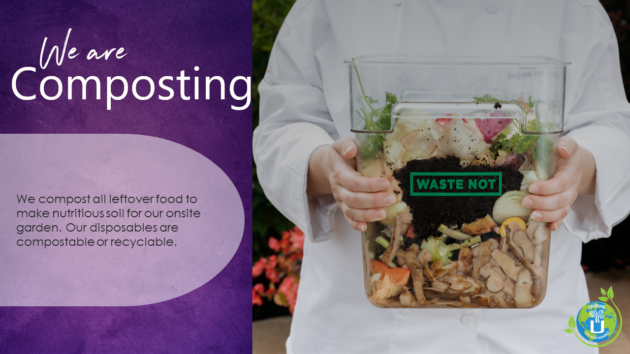We are Composting
Implementation Guide & Tools
We support our clients in recycling and composting programs.
-Fresh Food Pledge
Overview
What is Composting?
Composting is a natural process that decomposes organic waste using nitrogen, carbon, moisture, and oxygen. This process turns the organic waste into a dark, rich substance that is known as humus or compost. Humus can be used on all kinds of soils to provide the proper nutrients for plants and help them grow quickly.
Why Should You Consider Setting Up a Composting Program?
- Use your food waste to rebuild and replenish essential topsoil.
- Save client expense on waste disposable fees.
- Dispose of bio-based service ware, keeping it out of landfills OR contaminating plastic recycling processes where it doesn’t belong.
Things to Consider Before Getting Started:
- A site visit with the local composter and onsite facilities group is necessary to determine project viability.
- Some additional labor and equipment could be required.
- Staff training and signage (typically provided by composter) are necessary.
- A composting program would probably lower waste stream costs by a significant amount.
- Determine if offsite or onsite composting is best.
Offsite & Onsite Considerations
Offsite Composting
This process allows for the separation of waste onsite, and then the waste is hauled away by a private or government contractor. This is recommended for most sites, especially urban sites. This option is relatively easy if city or county services exist in your area. Private waste-hauling companies often provide comparable services.
- Visit www.findacomposter.com
- Enter your address to locate the nearest composting facility in your area.
- Contact the facility to get more information and the next steps.
Onsite Composting
This composting method requires the waste to be separated onsite, but materials are composted nearby rather than being hauled away. This option provides higher environmental benefits but needs more time to set up, maintain, and requires the purchasing of essential equipment.
Options for Onsite Pre-Composting Equipment
Digesters
- Process is limited to organic food waste (no compostable disposables)
- Requires micro-organisms to dissolve the food waste
- May not be compliant with local codes
- May require large amounts of water
- Output: Grey liquid discharged to a sanitary sewer
Pulpers
- Process includes organic food waste and disposables (including plastic/Styrofoam)
- If processing only organic food waste can this be an excellent pre-treatment for composting
- Recycles water for minimal impact
- Output: Pulped waste is 80% of the reduced volume
- Can be composted if waste stream ingredients are compostable
- Can be used to enhance soil in a garden setting
Dehydrators
- Process includes organic food waste and disposables
- No water usage o Requires up to 15 hours of processing time
- If processing only organic food waste and disposables, this can be an excellent pretreatment for composting
- Output: Dehydrated waste at up to 90% reduction
- Can be composted if waste stream ingredients are compostable
- Can be used to enhance soil in a garden setting
Partner with your Community’s Homegrown Gardening Program
A garden program is a great opportunity to engage on a regular basis. Using onsite composting to fuel the gardening program further reinforces a commitment to sustainability. If available, remind residents and staff to separate their compostable refuse making them active participants in the success of both programs.
Partner with Local Farms, Schools and Other Organizations
Seek out local farms, schools, and community composting programs. An internet search can yield a number of partner possibilities. Or expand existing relationships within your communities.

